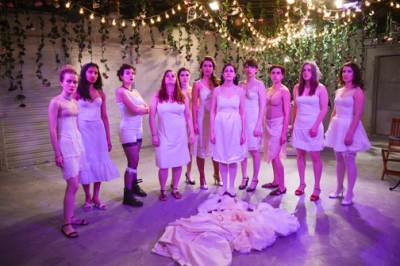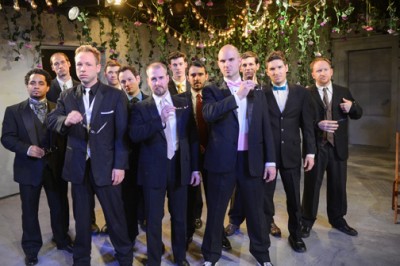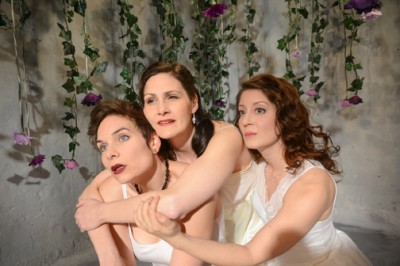Big Love
Directed by Matt Hawkins
At Strawdog Theatre
Big ideas, big stories, big performances, big heart.
In the classical version of this story, the Danaides at the center of Mee’s Big Love are punished for their misdeeds (that is, killing their husbands on their wedding night) with the task of filling a tub from which the water eternally empties. This has entered popular parlance as a symbol of trying to complete a futile task, but after watching Big Love, I can think of another interpretation: that of the vessel of the self forever emptying its contents into another as an act of eternal love. If that sounds twee, don’t worry, Big Love has some equally tart things to say about love’s demands, caprices, and the roles both men and women feel compelled to play or reject. Only loosely following the plot of The Suppliants by Aeschylus, this modern interpretation takes the fantastical and makes it a distorted mirror on humanity in the way the only the best fables can.
Set in the relative modern day, 50 sisters are fleeing Greece and their arranged marriages to 50 cousins to Italy to seek refuge at the house of Piero (John Henry Roberts). He’s not so sure he can offer asylum to these ladies, not just because there’s so many of them, but because he’s not certain he can protect them from their father and the contract he signed them into. Thankfully for the conciseness of the story, the sisters are rarefied into three—Thyona (Michaela Petro), Lydia (Stacy Stoltz), and Olympia (Sarah Goeden).
It’s not long before the men find them, and they are similarly broken into three camps of masculinity. Constantine (Shane Kenyon), Nikos (John Ferrick), and Oed (Kyle A. Gibson). As they mingle uncomfortably in Piero’s home, they battle and pontificate about the nature of obligation, love, choice, and perhaps most achingly, gender roles. There’s some lovely supporting roles in Eleanor (Anita Deely) and Bella (Cheryl Roy), who provide some outsider insight into the predicament. As the gay grandson Giuliano, Paul Fagen gets to show off his singing voice and strut in high heels in a delightful comedy interlude common to Greek plays.
Though the setup is mostly intact from antiquity, it’s the post-modern (it was first produced in 2000) interpretations that provide the meat of Big Love. Naturally, we’re sympathetic with these women—the spitfire feminist Tyrona, lovelorn Olympia, pragmatic Lydia—but we get the men’s side too. Constantine’s impassioned anger at the roles and expectations of men and how they are not as easy as one would think in a patriarchal society comes perilously close to the sound of a rich man bemoaning wealth.
In the end, however, it’s the women who have all the most interesting things to say about love, from Tyrona’s angry resistance to Olympia’s desire to be a bride to the hindsight of old Bella. And yet, it’s Lydia that emerges as the soul of the piece. Stoltz is an understated powerhouse of emotion that never strays into histrionics when she happens to fall in love with the sweet-natured Nikos.
It’s still common several years after its ending for people to use HBO’s seminal characters from Sex in the City as bywords for certain character traits (Miranda would be Tyrona, Lydia would be Carrie, Olympia would be Charlotte). Like City, Big Love’s characters are archetypal—some would say stereotypes—of various traits, and I can’t help but wonder if people in the days of Aeschylus would say, “Oh would you look at that rebel, she’s such a Tyrona.” Mee’s work doesn’t do much to advance the conversation of gender roles, and it is by his own admission a messy work with unfinished edges. Not everything gets resolved with a nice little bow, because not everyone can have a happy ending and love is always messy by nature.
There’s a lot going on in this battle royale of the sexes that makes everything old seem new again. In just 100 minutes, nearly every point on the spectrum of love is touched. It may not quite touch the heart, but it’s a fun collision of the unbelievable of antiquity and the frustrating banality of modernity that’s as high-spirited as it is high-style.
Recommended.
Reviewed by Clint May
Date Reviewed: April 22, 2013
At Strawdog Theatre, 3829 N Broadway, Chicago, IL 60613, call 773.528.9696 , tickets $28 ($18 student, $20 senior), Thursdays thru Saturdays 8pm, Sundays 4pm, running time is 100 minutes with no intermission, through May 25.




